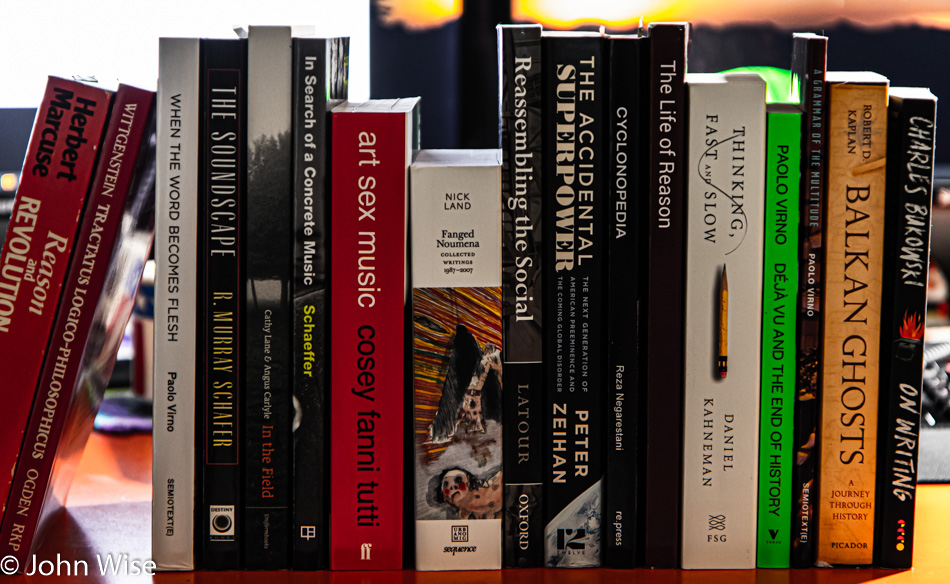
Redefining my reading list and expanding the corner of our antilibrary* that is a large part of our small living space. The roots of this change in programming started earlier this year when I was in Frankfurt, Germany. A meeting with an old friend Olaf Finkbeiner triggered thoughts of media philosophy ranging from Joshua Meyrowitz to Jean Baudrillard. Then about a week later in Weimar, contemplating yet older thoughts attached to my readings of Nietzsche, Goethe, and Schiller, I started reminiscing on the intellectual proclivities of people who think. Upon my return to the States, I came across the blog of a guy I’d met a couple of times back in the ‘90s when I was living in Frankfurt, his name is Achim Szepanski. Back in the day, I learned of the work of Gilles Deleuze through Achim but by that time I was deep into other subjects and not interested in pulling in one more thinker of obtuse complex ideas.
There seems to be a convergence of thinkers whose work is entering my orbit. Again, I have to return to Achim, as it was his website non.copyriot.com that enchanted me with his complex visualizations of thought experiments, turning the page into a canvas to explore the current evolution of political and economic landscapes.
Then, over the course of summer, I see references repeated, again and again, spurring me to resolve why all of a sudden I’m seeing these patterns. At this point a kind of frenzy of curiosity grabs hold and I need to know more. Cursory investigations point in a direction that over time nods to particular sources and the degrees of separation dissolve to the point I must follow some of these threads.
One of those moments distilled my curiosity into picking up books by Nick Land (Fanged Noumena), Reza Negarestani (Cyclonopedia: Complicity with Anonymous Materials), Alexandre Lefebvre (The Image of Law: Deleuze, Bergson, Spinoza), Quentin Meillassoux (After Finitude: An Essay on the Necessity of Contingency), Alain Badiou (Ethics: An Essay on the Understanding of Evil), Paolo Virno (When the Word Becomes Flesh: Language and Human Nature and a couple of others). There are other authors I have my eye on and a couple of things I pulled from the shelf of my antilibrary as I look for something that seems just out of reach.
What I’m on the hunt for is an understanding of humanity’s direction both socially and economically. I’m trying to glean some small insight that will let me feel I’m not on the outside of our trajectory.
Do I have hope that these texts and treatises will help light the way? In some small way yes but not in the profound red pill kind of way. Maybe they can act like slivers that penetrate the body of my mind infecting it with a non-lethal mix of tiny new inspirations that the antibodies of thinking can harness while strengthening my neural pathways into taking roads unseen.
* Nassim Nicholas Taleb writes in his book The Black Swan: “A private library is not an ego-boosting appendage but a research tool. Read books are far less valuable than unread ones. The library should contain as much of what you do not know as your financial means, mortgage rates, and the currently tight real-estate market allows you to put there. You will accumulate more knowledge and more books as you grow older, and the growing number of unread books on the shelves will look at you menacingly. Indeed, the more you know, the larger the rows of unread books. Let us call this collection of unread books an antilibrary.”